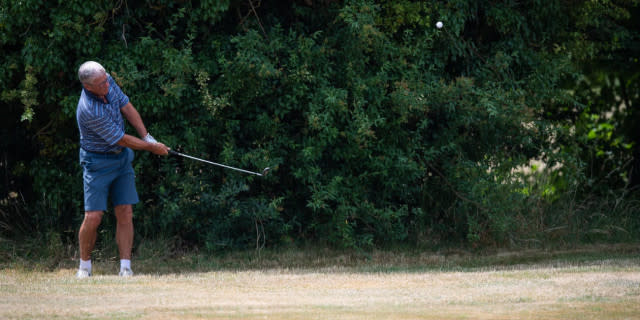
Is Golf REALLY in a Healthy Place Right Now?
There's been a lot said and written about the health of golf, but what is the perception of those who are on the ground? Much of the information disclosed by the governing bodies paints a positive picture of the current state of the game, but we wanted to see whether that was actually reflected in reality by surveying the everyday golfers who make up the Golfshake Community.
Putting the question to 1,200 keen players, we asked them: "Do you agree that golf is in a healthy place right now?"
The responses and findings have been illuminating, revealing a more complex situation than some would have you believe.
Many Golfers Report That Participation Has Increased
During the height of the COVID pandemic, we saw a significant number of returning and new golfers make their way to courses, which is a trend that has undeniably boosted the membership and visitor populations of many venues across the country and beyond.
This has coincided with the launch of many participation campaigns, both at national and regional level, which have sought to introduce the game to a greater number of youngsters and women in an effort to make clubs more inclusive and to readdress demographic imbalances that have long existed in golf.
Many of the golfers who responded to us cited increased participation, especially among younger players and women. When it comes to selling the benefits of golf, our game is (rightly) perceived to boost physical and mental health by offering exercise and social interaction, which were two things that people desired during those dark months of 2020 and 2021 - and continued growth has been a legacy of that era.
Let's take a look at some of the comments we received:
"Yes, the amount of new young members is encouraging at my club, all enthusiastic and keen to get better."
"Yes, investment in my club after years of neglect."
"Most golf clubs are very busy since COVID, which has to be good for the game overall."
"I feel it is a great sport and pastime for young and old, with both groups well catered for."
"Yes, it is good for mental health, exercise, and good to chat with friends and also new people."
"Yes, courses are busy and there are more retailers both on the ground and online."
"Yes, it's good to go outside in the fresh air."
"Yes, it is at my club as there is a waiting list for membership at the moment."

(Image Credit: Kevin Diss Photography)
The Cost of Golf is Concerning Many Golfers
Despite the positive statements above, there are some notable factors that should encourage caution. Chief among them is concern about the rising costs related to golf, especially in regard to green fees, membership subscriptions and the expense of equipment.
We have covered these topics in detail as venues look to combat the impact of inflation and operational costs of their own by increasing fees, but when does that cross into profiteering that could have unintended negative consequences? Some golfers fear that we're approaching that point.
"No. Golf is riding a fine line which could go either way if the balance of cost and quality is ignored."
"I think golf is getting close to being too expensive for a normal working class person, with other financial commitments."
"No, becoming too expensive. I play at a municipal and it's £40 on weekends plus £26 for buggy."
The World Handicap System (WHS) Continues to Frustrate
Despite the positives that those behind the system project, it's hard to escape the reality that many golfers remain dissatisfied by the World Handicap System and what it has brought to the game since it was introduced in the UK back in late 2020.
Some golfers believe that it's inherently flawed and is open to manipulation and impacts the integrity of competitions and club golf.
"WHS has ruined club golf. Handicaps do not reflect current ability, especially for golfers who don’t play a lot of golf."
"The WHS is a total joke. No scores are relevant for six months at our club, due to winter golf and preferred lies."
"Apart from WHS, which is a cheat's charter, yes."
"Not until the WHS is revised. Casual round handicaps are good to get players playing, but should not be used for competitive handicaps."
Pace of Play Issues
Golfers are consistent with their complaints as frustrations around pace of play continue to be raised by keen players. Demanding better management in terms of education, tee time spacing and marshalling on the course, a large proportion of the golfing population remains unhappy about the time a round of golf takes, stating that it detracts from their experience playing the game.
"No. Slow play is a major issue at present."
"Slow play and WHS bandits need constant surveillance and weeding out though."
"Pace of play and course etiquette still an issue on many courses."
The Condition of Golf Courses
What about the golf courses themselves, those landscapes on which we spend so many magical and rewarding hours? Rising maintenance costs have been an issue for many clubs to manage, while the impact of the climate has made it even more challenging to present a product that will satisfy those who pay to play the layout.
Recently in the UK, we have seen the effect of both wet winters and dry heatwaves can have on the ability of greenkeepers to maintain fairways and greens to a level that golfers ideally want to see.
"Not at the public course where I play, it's in a decline through lack of funding."
"Clubs are struggling with costs and encouraging new members."
Has Golfing Etiquette Declined?
Some golfers had concerns that the behaviour of others on the course was in decline, with many disappointed by those who don't repair pitchmarks, rake bunkers properly, and generally display a lack of consideration for others.
"A lack of knowledge and poor behaviour seems to cause problems on courses I play. Five ball groups, arguing, drinking, taking too long and lack of course knowledge seems commonplace."
"Too many people don't care. Beginners should include etiquette. Raking bunkers, etc."
"There seems to be a slow transition from old school traditional golf values to newer 'it’s just a sport' ideas."
While these complaints are valid, it's probably also true that such issues have existed for generations and that some of those on the course don't pay enough attention to how their actions can affect others.
Golf Courses Are Still Closing
Despite all the positive stories and research conducted by those in charge of the game, we are still seeing golf courses close across the country, whether it be public layouts being cut by local councils or private clubs being no longer sustainable or taken over by property development.
That is a concern for many golfers.
"No, too many courses closing and being sold for development. Attempts to attract younger golfers seems to be suffering with lowering standards (etiquette/standards of playing and clothing) and thus create an ‘us and them’ type attitude with the older golfers."
"I think it is in a perilous place right now. Costs are rising, the weather is changing, the greenkeepers are restricted on what can be put on the course and members are feeling the pinch financially."
"No, courses are under threat of building over."
Golf Needs to Become More Inclusive
There have been many laudable efforts deployed to bring more young people and women into the game, and the perception is that these have succeeded in places, but there is no doubt that more work is needed to ensure that the sport has a future that can be sustained for generations to come.
It's something that some of the golfers who replied to us are keenly aware of.
"Golf needs to adapt to our changing younger member needs. The old fuddy duddy approach to golf needs to encourage youngsters as they are the future of golf clubs."
"Golf alone is no longer viable as a business. Clubs need to diversify their offer to support the golf."
What Can Make Golf Healthier?
While it can be easier to complain about issues that you see, coming up with potential solutions is more complicated, but we did receive suggestions from the golfers who responded to our recent survey.
These included...
- Clubs should focus on better financial management and consider the affordability for all age groups.
- There should be more efforts to attract and retain younger members and improve the inclusivity of the sport.
- Better enforcement of pace of play and course etiquette is needed.
- More flexible membership options and pricing structures could help make golf more accessible.
- Investment in course maintenance and facilities is crucial to keep up with the expectations of members and visitors.
Is There Optimism For The Future of Golf?
The ultimate question is whether golf is in a position to ensure that the sport is in a strong place in the decades to come. There is no doubt that many clubs have benefitted from rising membership and visitor numbers and find themselves in a thriving position, but others are clearly struggling financially and face hurdles to overcome in both the short and long term. Generally, we believe that there is reason to feel optimistic about where golf is at, but there are issues beneath the surface that have to be tackled to make sure that remains the case going forward.
Related Content
What Stops Golfers Playing More Often
Green Fees Keep Rising at Golf Courses But Are They Worth It
Why Can't Golfers Get The Tee Times They Want
Why Many Golfers Still View The World Handicap System Negatively
These Storm Clouds Are Hanging Over Golf Clubs
What More Golf Clubs Are Finally Getting Right
What Golfers Think About Club Membership in 2025: 10 Key Topics
About the author

Kieran Clark is the Digital Editor of Golfshake. He oversees editorial content, community engagement, forums, and social media channels. A lifelong golfer from the Isle of Bute in Scotland who has now lived in St Andrews for a decade, he began playing at the age of five and maintains a passion for exploring courses, with a particular affection for historic layouts. Kieran regularly contributes in-depth opinion pieces and features, drawing on his enthusiasm for the game and its culture.
Tags: industry insider GOLFERS Golf Clubs Golf daily picks









